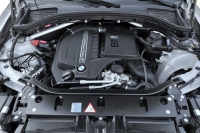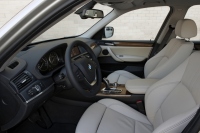
Automotive Intelligence - the web for automotive professionals and car enthusiasts
November 03, 2010
This Week:
-
The new BMW X3 - A new dimension to the pleasure of driving a Sports Activity Vehicle
-
The sound of silence: How Audi is working on the acoustics of future electric cars
-
BMW Concept C. - The scooter of the future made by BMW Motorrad
-
Audi Group Reports Record Operating Profit of € 940 Million in Third Quarter
-
New Volunteer VTX Cross-Over Concept Stakes Claim in New UTV Class at SEMA
© 1998 - 2010
Copyright &
Disclaimer
Automotive Intelligence,
www.autointell.com
All Rights Reserved .
For questions please contact
editor@autointell.net
|
The new BMW X3 - A new dimension to the pleasure of driving a Sports Activity Vehicle
Munich - The new BMW X3 is the successor to a top seller and will add a new dimension to the pleasure of driving a Sports Activity Vehicle of this class. More significantly than ever, it establishes benchmarks in driving dynamics, agility and efficiency, whilst at the same time convincing through noticeably increased driving comfort. The design of the new BMW X3 combines the typical BMW X character with a dynamically stretched silhouette. Thanks to a generous amount of space and a high degree of variability in the interior, it is possible to adapt travel comfort as well as transportation capacities to suit each personal requirement. |
|
|
|
|
|
Four-wheel drive technology BMW xDrive not only optimises traction, but has also been specifically harmonised to ensure enhanced driving dynamics. The new BMW X3 offers fascinating qualities with uncompromising diversity, combining both driving pleasure and efficiency with comfort and functionality, sportiness and elegance.
The new BMW X3 xDrive35i is powered by a straight-six petrol engine with a maximum output of 225 kW/306 bhp. This makes it by far the sportiest model within its competitive environment. Engine range: Four-cylinder diesel and straight six-cylinder petrol engine of the latest generation
The engine develops sufficient power to allow the vehicle to accelerate from 0 to 100 km/h in 8.5 seconds, reaching top speed at 210 km/h. With an average fuel consumption of 5.6 litres/100 km, the BMW X3 xDrive20d establishes a new benchmark for efficiency in this vehicle segment (CO2 emission level: 149 g/km in conjunction with manual gearbox, 147 g/km in conjunction with automatic gearbox). Spontaneous response, high-revving characteristics, excellent running smoothness and outstanding efficiency characterise the power unit featured in the BMW X3 xDrive35i. The 3.0-litre straight-six engine featuring BMW TwinPower Turbo, direct petrol injection and VALVETRONIC generates a maximum output of 225 kW/306 bhp at 5,800 rpm. Maximum torque of 400 Nm is available between 1,200 and 5,000 rpm. The sprint from 0 to 100 km takes a mere 5.7 seconds. Top speed is 245 km/h. The BMW X3 xDrive35i offers not only the most dynamic driving characteristics, but also by far the most favourable fuel consumption and emission levels within the competitive environment of its engine class. Average consumption in the EU test cycle is 8.8 litres/100 km (CO2 emission level: 204 g/km). BMW EfficientDynamics in the new BMW X3: Premiere for Auto Start Stop function in conjunction with automatic transmission The new BMW X3 xDrive35i is equipped as standard with an eight-speed automatic transmission. This option, also unique within the competitive environment, is available for the BMW X3 xDrive20d as an alternative to the standard six-speed manual gearbox. As an option, the new BMW X3 xDrive35i comes with a sports automatic transmission with shift paddles on the steering wheel.
Furthermore, the equipment featured in all model variants, which include brake energy regeneration, EPS Electric Power Steering, demand-controlled ancillary components, intelligent lightweight construction and tyres with reduced rolling resistance contribute towards lowering fuel consumption and exhaust emission levels. Production at the BMW Spartanburg plant The new BMW X3 is produced at the BMW Spartanburg plant in accordance with stringent BMW Group quality standards. With the production of the BMW X5 and BMW X6 models, the location, which is based in the US Federal State of South Carolina, has become the competence centre for BMW X models within the BMW Group’s worldwide production network. Thanks to comprehensive extension measures, the preconditions for integrating the new BMW X3 into the production process have also been established. Photos: BMW (15.10.2010) |
|






